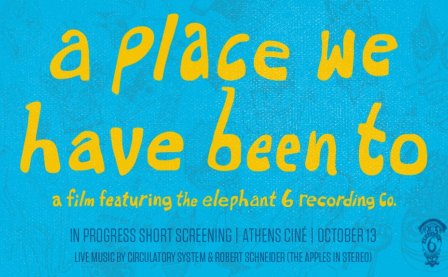1. So, musical parallels. Take Broadcast and The Focus Group’s Investigate Witch Cults of the Radio Age, which frames songlets within droplets and shards of noise, blur, hiss, and smother, occasionally resolving into a direction (i.e., a momentum that’s outwards, not inwards), before parting back again into the miasma of someone else’s trip. This is like that, but it also isn’t. To be honest, with something this insular and nebulous, reference points won’t do much good, unless it’s to something else as entirely self-referential and locked off from external parsing. After having flirted with the notion on the last two Circulatory System long players, this is the point where Will Cullen Hart goes full Tlön, Uqbar, Orbis Tertius.
2. Let’s find a new way in. A lot of W.C. Hart’s lyrics are preoccupied with the idea of locating yourself within the whole whorl of the earth-psychedelia-human experience, be it from underneath, above, sideways, chronologically, anyhow, anyway, somewhere between the “rock and stars and sand.” Worrying about this means a few important things; you don’t trust either the environment or your sense of it (or both, for that matter), and as such, finding yourself continually dumped in an unfamiliar landscape, you’re having to constantly reapprehend, reformulate, and redescribe your psychic coordinates. Without that, there’s the “Risk I’ll fall/ Forever,” “Forever” perhaps being the most ominous idea in the whole Circulatory System megaverse. The key question is: “Do You Know What’s Real?,” and the answer comes in constantly asking the question (despite the “pitiful conclusions” arrived at). “If You Think About it Now” disappears and submerges, then reappears slower, different, new, like trying to knock on someone’s door with a different rhythm after finding yourself unheeded. When “songs” emerge, they’re the sound of a canary reporting from the bottom of a mineshaft.
3. Key sequences abound in the narrative, like this one: “Could you ever/ Would you ever know?” runs “There is No Time But Now,” before the sky dissolves into puffs of cotton, before an out-of-phase chorus of anxious voices declare that it’s the age of mud. Then W.C. Hart is back: “You might never know why/ There’s reasons you don’t know.” If being trapped in an acid trip is waiting for your original sense of reality to return, the circular, spiraling, infinitely recursive logic of Mosaics within Mosaics is the Waiting for Godot psychedelic music has been waiting five decades for. The title track is framed by Mosaics #3 and #4, just to add a wink. The first section in the “Mosaic” sequence is iterated as a Fahey-esque lilt, then dissolves into a haunting, huge-black-insect drone, as if to underline the fact that you’re on your own; you’re even outside history here, friend.
4. The first time I took acid, I was in the park surrounding the art gallery in New Orleans. Staring at the clouds, I saw whole alphabets cycle and reform into endless libraries, forming constantly and whirring like gears, receding behind one another infinitely as cathedrals drawn by strings of new, depthless words passed over them. Acid stories like that one are, always, completely boring, but that’s the challenge inherent in a work like this one; transforming the ineffable substance of something that is completely lost in any utterance that tries to convey it. Like, there have been acid records before, and then there’s this. In terms of psychological realism, this has a partner in another album this year that, on first listen, might seem too unwieldy, too big, too cavernous; Actress’ Ghettoville. If that worked out for you, you might get to the bottom of this, but talking about dimensions here feels like the wrong kind of language. It’s more like the chestnut about never stepping in the same river twice, except the river is stepping on you.
5. The clouds break just once, really, and it’s pretty astonishing when it does; a huge, strange chord progression trills out a plangent march thick with a sighing accordion — about as classic an Elephant 6 move as you can get. It’s called “Sounds You’ve Never Heard,” and for about 40 seconds, everything assembles into a way out, a path clean through and away. Then you’re back within the gears. You’re on your own. Cue W.C.H.: “Does it feel/ like a dream/ that we’ll never wake up from?”
More about: Circulatory System




